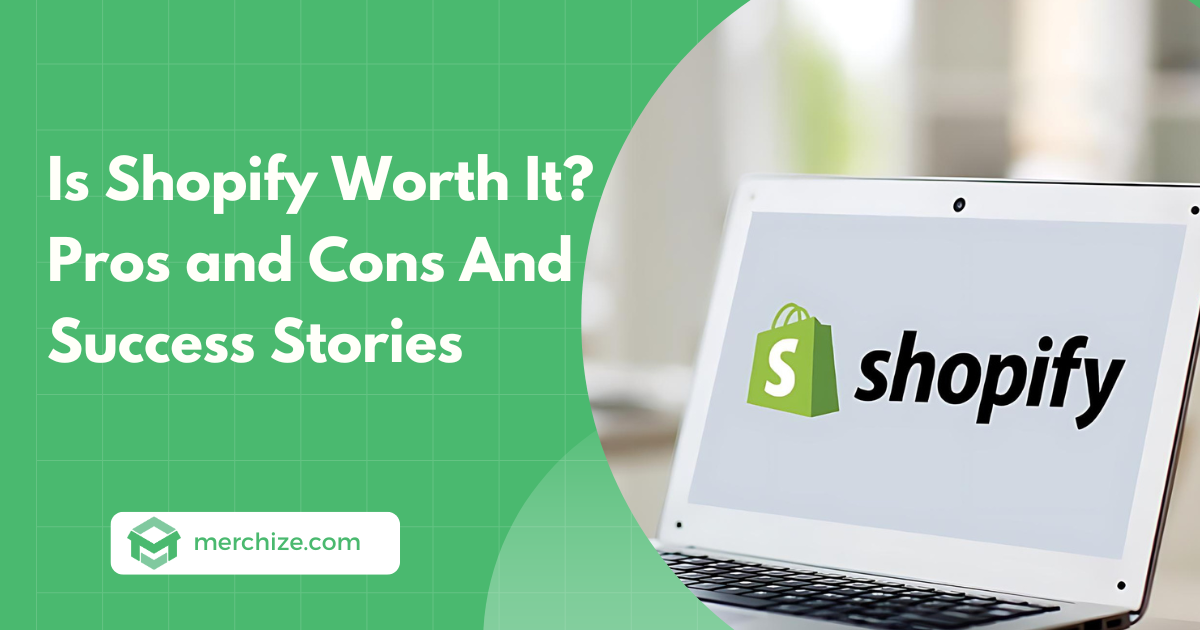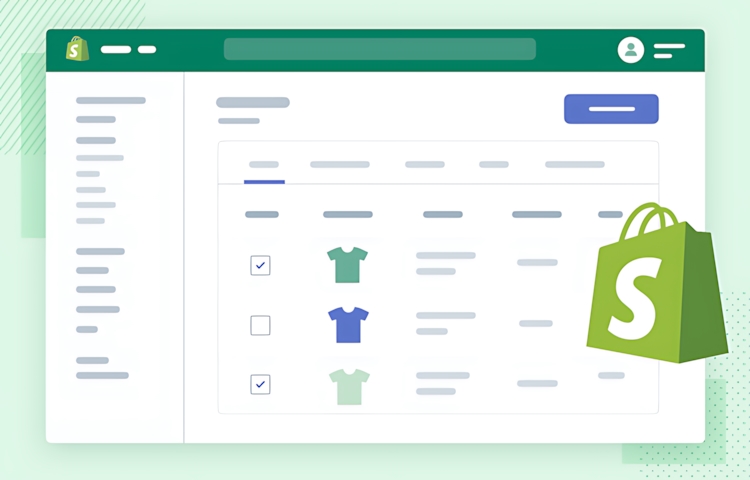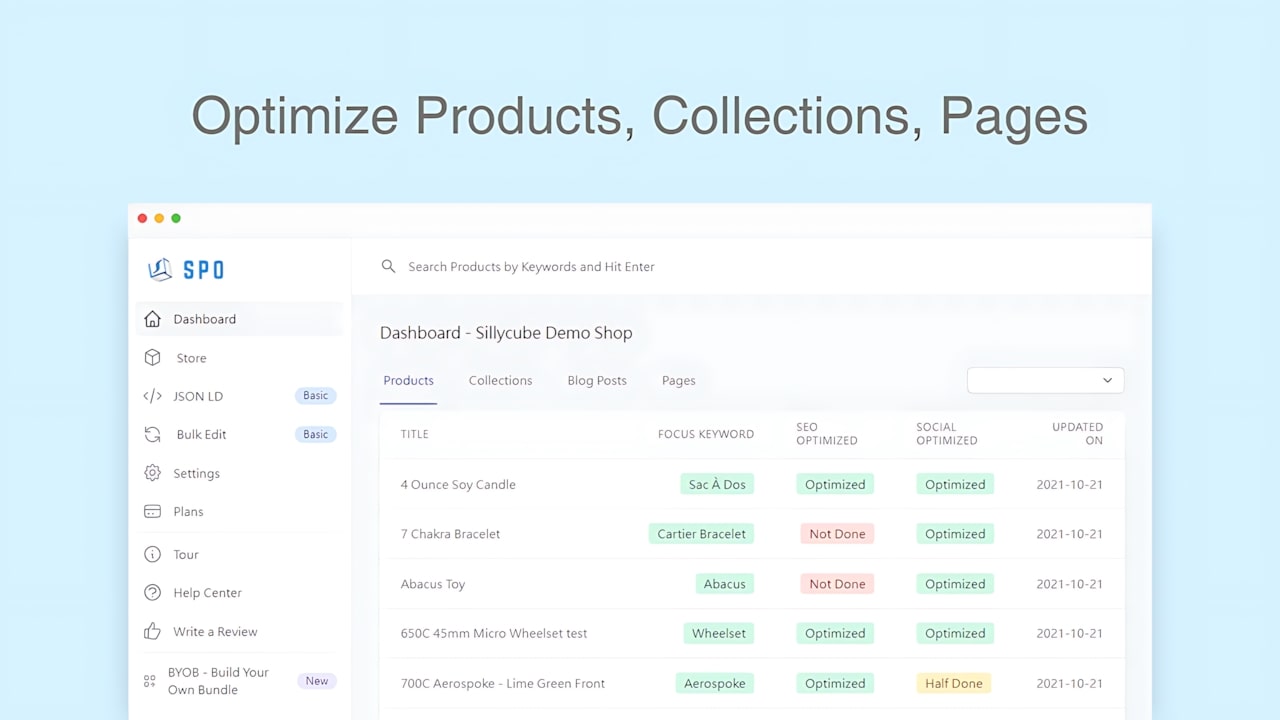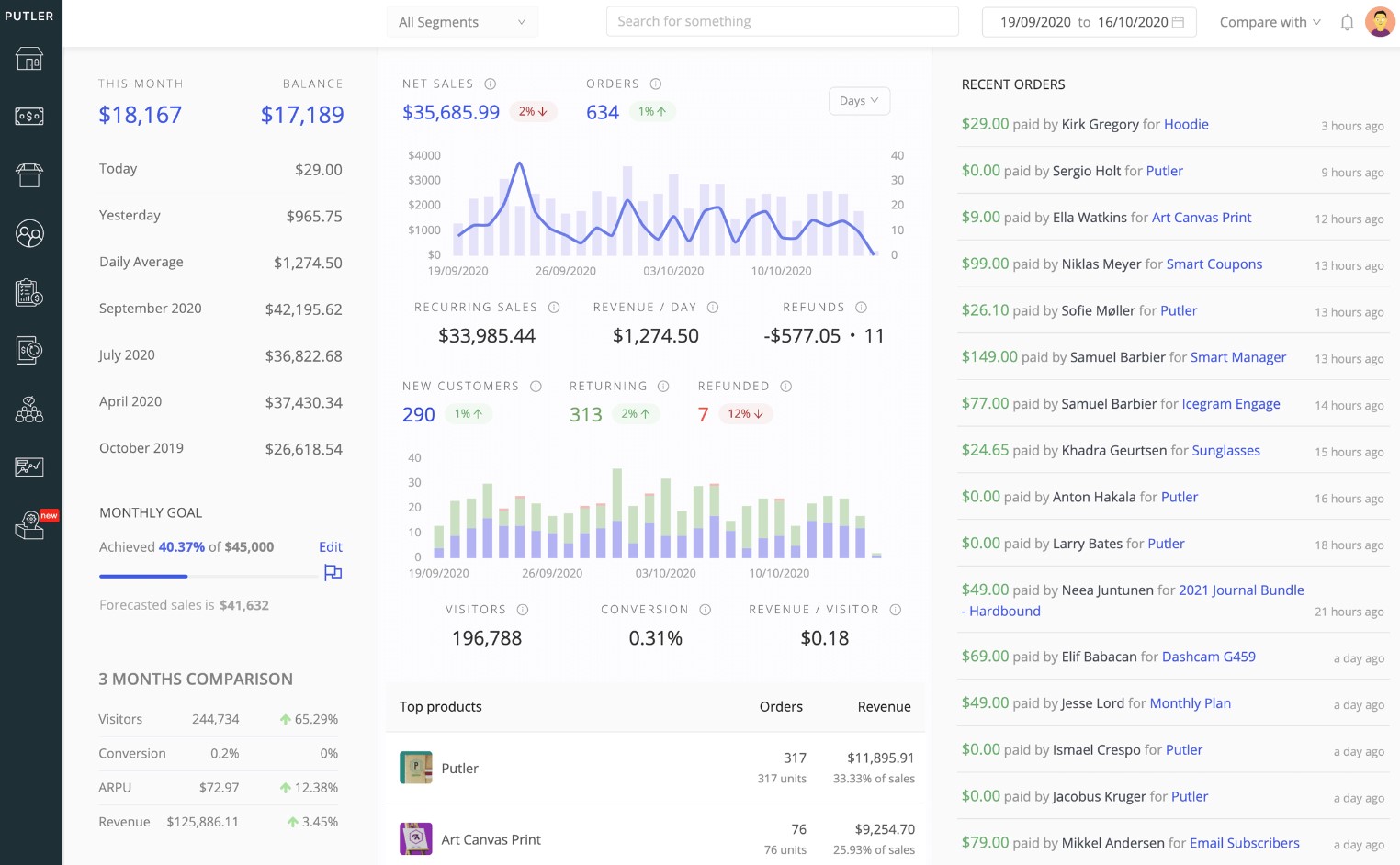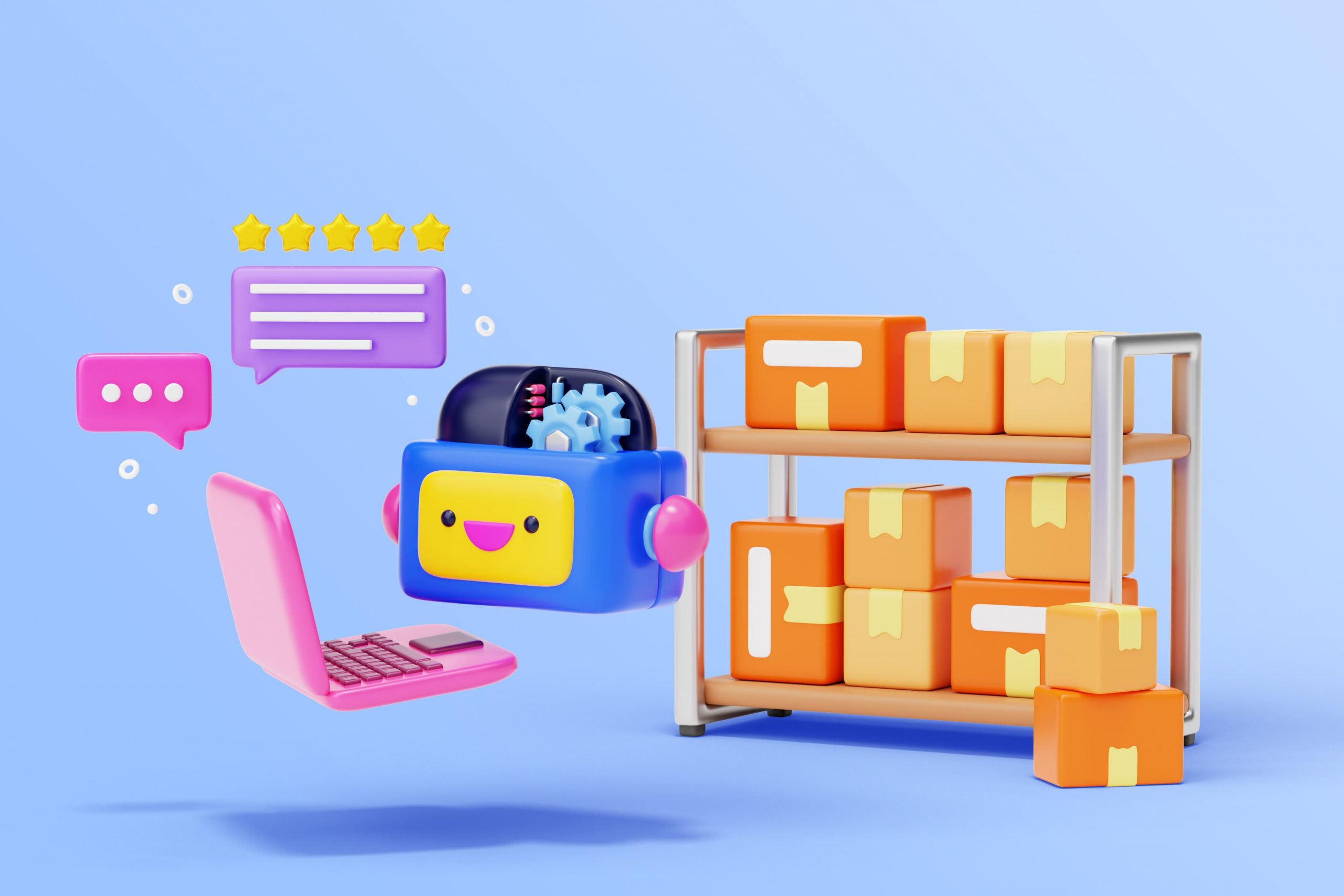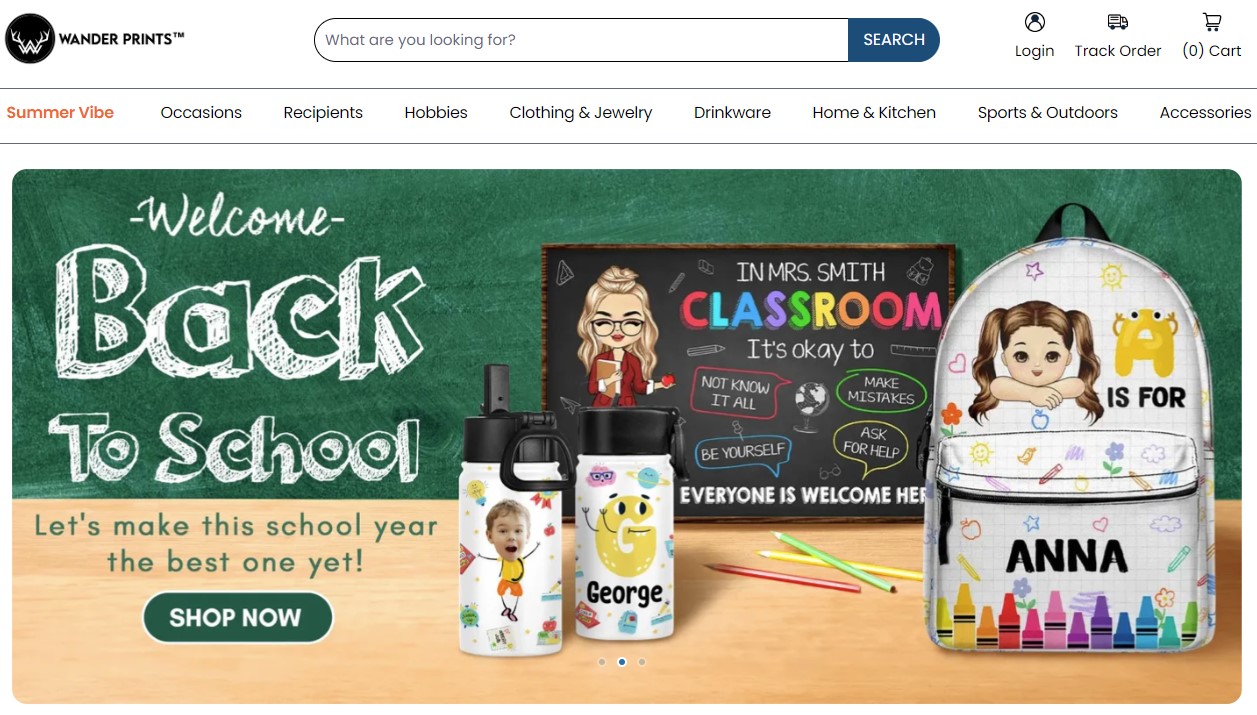Contents
If you want to do business online with a beautiful website and many features, then Shopify remains a top choice for entrepreneurs in 2025. With over 4.7 million e-commerce sites being built with Shopify, it helps online sellers in over 175 countries create beautiful websites without cost or need to be a computer expert. However, is the platform still worth the investment? In this blog, we’ll examine the pros and cons of using Shopify, helping you decide if it’s the right fit for your business.
Is Shopify Worth It?
Yes, Shopify is still worth it in 2025 for most e-commerce businesses. As of the second quarter of 2024, Shopify boasts 4,790,000 live online stores worldwide. In 2023, there were 2,127,583 live stores, meaning the number of Shopify stores has more than doubled, increasing by approximately 125% in the past year. While the costs can add up, the value Shopify provides in terms of simplicity, customizability, and scalability makes it a worthwhile e-commerce platform for many store owners.
Specifically, Shopify makes e-commerce easy for even those without technical expertise. Its intuitive interface and range of templates allow you to quickly build a professional storefront. The extensive App Store provides access to numerous integrations and functionality upgrades to customize your store. This combination of simplicity and customization is extremely valuable.
Why is it so popular for e-commerce?
Shopify is popular, especially among beginners and small brands because it makes launching an online store fast and accessible. Unlike marketplaces like Amazon, where competition is intense and FBA fees can eat into your margins, Shopify gives sellers full control over their brand, pricing, and customer relationships.
Still, it’s not without downsides. Many essential features depend on third-party apps, and critical tools like tax and customs calculations are locked behind the highest pricing tier at $300/month. While the platform advertises a $30/month entry point, costs can rise quickly once you add premium apps – making it a much heavier investment for new stores. (Reddit)
Another point of frustration is the lack of customizable URL structures, a basic feature many users have requested for years. This was a dealbreaker for some, pushing them toward alternatives like WooCommerce.
In short, Shopify lowers the barrier to entry, but whether it is truly cost-effective or flexible enough comes down to your needs and budget. That is the real question behind is Shopify worth it.
Pros and Cons of Shopify
Like any platform, Shopify has its strengths and weaknesses. Let’s dive into the key pros and cons of Shopify to understand its value better.
| Pros of Shopify |
Cons of Shopify
|
| Made for Print on Demand (POD): Shopify integrates with platforms like Printful for easy product sales without inventory management. |
Limited Design Customization: Customization options are more restricted compared to other platforms like Magento.
|
| Easy to Use: User-friendly interface for non-technical users to set up and manage a store. |
Reliance on Apps: Many key features require paid third-party apps, increasing costs.
|
| Scalable: Supports businesses of all sizes, adapting as your business grows. |
Checkout Customization Limits: Limited options for customizing the checkout process.
|
| Wide Range of Tools: Extensive app store with over 8,000 apps for enhanced functionality. |
No Email Hosting: Shopify doesn’t offer email hosting, requiring third-party solutions.
|
| Reliable and Secure: Provides hosting and security, allowing you to focus on your business. |
Complex Migration Process: Moving stores to or from Shopify can be technically challenging.
|
| 24/7 Customer Support: Accessible support through chat, email, phone, and tutorials. |
Third-Party Transaction Fees: Additional fees apply when using external payment gateways.
|
| Multiple Payment Solutions: Supports diverse payment gateways for smooth transactions. |
High Costs: Monthly fees, app costs, and transaction fees can add up quickly.
|
| SEO Capabilities: Built-in SEO tools to optimize visibility in search engines. |
Limited Inventory Management: More advanced tracking requires third-party apps.
|
| Multi-Channel Selling: Enables selling across platforms like Amazon and eBay. |
URL Structure Limitations: Restrictions on customizing URL structures may impact SEO.
|
The Core Features of Shopify
When you evaluate Shopify and Shopify Plus, it’s important to understand the core features that distinguish it from other e-commerce platforms.
User-Friendly Interface
One of Shopify’s standout features is its easy-to-use interface. The dashboard provides a clean layout that allows store owners to access key information and tools with just a few clicks. Even those without coding experience can customize the look of their store using themes and drag-and-drop editing.
Shopify also offers a mobile app so entrepreneurs can manage their businesses on the go. The app provides insights into store visits, orders, and products. Business owners can even add new product listings and fulfill orders from their smartphones. This simplicity and flexibility have helped fuel Shopify’s rapid growth.
SEO Capabilities
Visibility in search engines is critical for driving traffic to an online store. Shopify builds SEO best practices into its platform to help merchants optimize their discoverability.
The software automatically generates metadata descriptions, page titles, alt text for images, and semantic markup. Store owners can also manually customize these elements to target relevant keywords. Advanced Shopify plans provide further SEO support including site speed optimizations and reports identifying opportunities to improve ranking.
By following Shopify’s SEO recommendations, entrepreneurs can increase organic visits without needing advanced technical skills. The platform handles much of the heavy lifting when it comes to search optimization.
Secure Payments
Shopify securely handles transactions so entrepreneurs don’t have to become payment gateway experts. The platform offers an integrated payment system that works with major credit cards and third-party processors like PayPal.
Customers can safely enter their payment details and complete purchases on the store’s site without being redirected. Shopify also provides a payment portal so store owners can view transactions, track fees, issue refunds, and manage chargebacks from one place.
The integrated payment process creates a smoother buying experience that helps convert more sales. Store owners also spend less time reconciling payments across multiple accounts.
Dropshipping Integration
For entrepreneurs who don’t want the overhead of purchasing inventory, Shopify simplifies building a dropshipping operation. Its ecosystem contains thousands of suppliers offering products that can be listed on your store. This makes it easier to find products to sell on Shopify without worrying about warehousing and logistics.
You can import item catalogs through the Oberlo app to quickly build out product offerings. As orders come in, Oberlo fulfillment tools facilitate communicating the customer’s shipment details to your chosen supplier. Automating order forwarding eliminates manual work so you can focus on business growth.
Shopify also provides guidance on coordinating multiple dropshippers to create a unified shipping experience. Overall, Shopify’s dropshipping capabilities minimize logistical hurdles so even first-time e-commerce owners can expand their catalog.
Powerful Analytics
Understanding your store’s metrics is crucial for making smart business decisions. Shopify provides a robust analytics dashboard covering essential e-commerce data points.
You can view key performance indicators like monthly sales volumes, average order value, top-selling items, and conversion rates. More detailed reporting provides visitor demographics, acquisition channels, shipping times, refund rates, and other intelligence.
Shopify also surfaces actionable insights like which blog posts attract the most traffic. This data visibility empowers entrepreneurs to identify new opportunities to attract customers and maximize profits.
While analytics come standard, Shopify offers additional functionality through its Shopify Plus enterprise plan. These advanced tools enable multi-channel reporting, personalized customer profiles, custom data visualization, and more in-depth analysis.
Abandoned Cart Recovery
Abandoned shopping carts are a big thorn for online merchants, contributing to billions in lost revenue annually. Fortunately, Shopify provides automated tools for recovering these sales opportunities.
Using customer email data, Shopify can track when someone leaves items sitting in their cart. Merchants can trigger automated emails reminding customers about the items left in their cart along with incentives to complete their purchase.
The platform makes it easy to customize abandoned cart messaging for each stage of the funnel. For example, initial emails may focus on the benefits of the forgotten products while later communications promote discounts or free shipping.
According to Shopify, cart recovery features help merchants reclaim over 20% of abandoned checkouts on average. That translated into over $6.4 billion in recovered revenue in 2021. The set-it-and-forget capabilities require no ongoing work other than reviewing performance through analytics.
24/7 Customer Support
Growing an online business involves a learning curve, especially for first-time entrepreneurs. Shopify eases the transition through round-the-clock customer support via live chat, email, phone, and social media.
The company’s guides, tutorials, forums, and webinars also provide ample educational resources to demystify running an e-commerce operation. Mentorship opportunities even connect merchants directly with experts to overcome individual hurdles.
Knowledgeable support helps troubleshoot technical issues, explain advanced functionality, and offer strategic business advice tailored to each store’s needs. Relying on Shopify’s assistance minimizes frustrating roadblocks so entrepreneurs can maintain momentum.
Extend Functionality Via Apps
While packed with e-commerce features, Shopify doesn’t try building every tool business owners might ever need. Instead, it offers an app store containing thousands of integrations curated to mesh perfectly with your Shopify admin.
Shopify apps enable enhancing core functionality like email marketing, accounting, and inventory management. You’ll also find apps providing supplemental capabilities Shopify lacks out of the box like creating gift cards or establishing customer loyalty programs.
The app ecosystem saves you from complex, costly custom development. With a few clicks, your store absorbs advanced features fueling the next stage of growth. Shopify apps also adhere to strict security protocols protecting sales data and customer privacy.
By combining essential commerce tools with the flexibility of extensions, Shopify allows stores to continually evolve according to their needs. You get a future-proof e-commerce engine capable of scaling up or down.
Affordable, Scalable Pricing
Shopify aligns pricing tiers to the growth trajectory of small e-commerce businesses. The basic Shopify plan runs just $29 per month providing core sales channels, secure payments, shipping integrations, and unlimited hosting bandwidth.
As your monthly sales volume climbs, you can upgrade to plans offering more advanced functionality and lower payment processing fees. Once exceeding $1 million in annual sales, the enterprise-geared Shopify Plus plan delivers additional support, custom integrations, and dedicated infrastructure.
Unlike other platforms requiring you to predict future needs via rigid pricing packages, Shopify allows seamlessly transitioning plans to match your current business requirements. These flexible options ensure entrepreneurs only pay for exactly the services they use.
Shopify also won’t penalize your success with sudden fee hikes or surprise charges like some e-commerce competitors. The company makes its pricing philosophy transparent so rapid growth won’t catch you off guard. Such reliability offers peace of mind as you scale revenue.
Shopify with Small Business
If you’re running a small business and wondering if Shopify is right for you, the answer is yes. Shopify is a great choice for small businesses thanks to its ease of use and unlimited scalability. You don’t need to be a tech expert to create a professional online store thanks to customizable themes and hundreds of powerful business support apps, from order management to marketing automation.
In addition, Shopify also offers SEO and email marketing integrations to help users optimize their visibility and reach their target customers. Although there is a monthly fee, it is worth the cost when you are provided with a reliable and secure platform with 24/7 customer support, helping your business grow sustainably.
Shopify with Dropshipping
Shopify is one of the leading e-commerce platforms for dropshipping entrepreneurs, loved for its direct connections to major marketplaces and seamless integration with dropshipping apps. This simplifies sourcing and ensures fast and efficient order fulfillment. Moreover, its easy-to-use interface allows you to set up a professional store in just a few hours, while millions of sellers have proven its reliability. Whether you’re just starting or looking to expand, Shopify offers a powerful ecosystem and tools to support the sustainable growth of your dropshipping business.
Shopify Success Stories
Cuyana ($50 million/year)
Brand Story
When Karla Gallardo co-founded Cuyana in 2013, she set out to build a fashion brand focused on “fewer, better" products based on the principles of quality and sustainability.
Gallardo herself was fed up with “throwaway culture" and believed women wanted long-lasting items made ethically. She just needed to provide that option
Recipe for Success 🏆
Laser focus on quality over quantity. While the fashion industry pushes trends and new inventory, Cuyana intentionally keeps its core product line small.
Each leather bag, for example, is made from premium materials by skilled artisans. And products come with a lifetime guarantee – backed by the in-house repairs team.
This focus on ethical production and durability over fast fashion fuels incredible brand loyalty and repeat purchases. Helped by strong content marketing and community engagement, Cuyana has grown over 800% in 8 years.
Powered by Shopify tools like SMS marketing, the brand maintains personalized dialogues with customers and continues innovating its lean e-commerce model.
2024 Projections
Cuyana is projected to drive over $50M in revenue next year by expanding internationally and offering new product categories like knitwear and small leather goods.
However, the team remains committed to the B Corp-certified brand’s core value of less but better to avoid dilution.
Takeaway
Lead with purpose and quality. By tackling fast fashion waste and poor working conditions head-on, Cuyana has resonated with conscious consumers looking for ethical but stylish options.
Their resilience through economic shifts comes from a lean business model and loyal customers who invest in quality pieces.
Chubbies ($45 million/year)
When Rainer Castillo, Tom Montgomery, Preston Rutherford, and Sam Shiller founded apparel company Chubbies in 2011, they simply wanted to spread their nostalgic love for men’s retro shorts.
The four friends associated the shorts with carefree weekends from their youth and sought to build a lifestyle brand around that feeling.
Recipe for Success 🏆
Leveraging quirky social media campaigns featuring pop culture references, contests, and user-generated content, Chubbies built a vibrant community of over 1.6 million followers on Facebook.
Central to their $45 million yearly success is Chubbies’ playful tone of voice and masterful customer engagement.
The brand affectionately calls its fans “Chubsters" and “Chubster Nation", driving an incredible feeling of belonging to something joyful. This emotional connection translates into strong brand loyalty and repeat purchases.
2024 Projections
Projected to drive over $100M in sales next year, Chubbies continues innovating social campaigns to spread its message globally.
While launching new products like hoodies and swim trunks, the team remains committed to the brand’s origins in men’s shorts and homemade content.
Takeaway
Sell a lifestyle, not just clothes. By adopting an ultra-casual brand voice, Chubbies struck a chord with male college students seeking apparel reflecting their relaxed life.
This reminds us how creative brand building and customer relationships foster true fans eager to share your story.
Wander Prints
When stay-at-home mom Jamie launched Wander Prints in 2019, she simply wanted to design fleece blankets evoking her favorite childhood memories of carefree summer days. But leveraging print-on-demand and Jamie’s creative vision, Wander Prints swiftly grew into a one-stop home decor and gifting brand.
The Shopify store now offers over 5,000 items from mugs to pillows featuring relaxed, sunny motifs. Jamie also expanded into beach towels, eco-friendly straws and other innovative summer-themed products.
Recipe for Success 🏆
By focusing on unique bestsellers like fleece blankets and doormats, Wander Prints stands out from crowded home goods competitors. Jamie also nurtures customer relationships through personal touches like hand-written notes. These thoughtful extras drive repeat purchases.
Wander Prints also actively listens to customer feedback to improve experiences. Recent initiatives include translating the Storefront for global expansion and implementing carbon offset shipping.
2024 Goals
Projecting over $5 million in sales next year, Wander Prints aims to collaborate with other mompreneurs and launch a line of products celebrating female entrepreneurs.
But Jamie’s team remains committed to Wander Prints’ origins in carefree summer nostalgia rather than solely chasing profits. Expect more brands celebrating freedom and sunshine as the company continues living its mantra.
Takeaway
Sell a feeling with your brand. By infusing designs with the spirit of childhood summers, Wander Prints taps directly into nostalgic emotion to drive sales. Make customers feel something special.
Seamlessly Launch Your Shopify Store with Merchize Integration
As an all-in-one commerce platform, Shopify makes starting an online business incredibly easy. With its free trial and extensive resources, anyone can get up and running with their own customized online store. However, fulfilling orders and managing inventory can get complicated as you scale. This is where Merchize comes in.
Merchize seamlessly integrates with your Shopify store to completely handle order fulfillment. With just a few clicks, you can connect your Shopify admin to Merchize and synchronize your product catalogs.
Then simply choose the items you want Merchize to produce and ship out. As orders come in, Merchize will automatically print, package, and ship products to your customers. The Shopify integration even shares shipment tracking details back to the Shopify workflow.
Merchize also delivers design flexibility through its Mockup Generator. Swiftly mock up products with your branding and publish them to social platforms and your Shopify store. Showcase products before needing to manufacture a single unit.
Some key benefits of integrating Merchize into your Shopify store include:
- Access to 400+ Customizable Product Designs
- Free Mockup Generators
- Packaging & Label Customization
- Automated Order Fulfillment
- Global Distribution Network
- Automatic Shopify Tracking Updates
- Higher Profit Margins
By leveraging this integration to simplify order processing and inventory/shipping logistics, you can concentrate fully on branding, marketing, and customer experience. Ultimately, Merchize allows your Shopify-powered business to scale faster at reduced risk.
